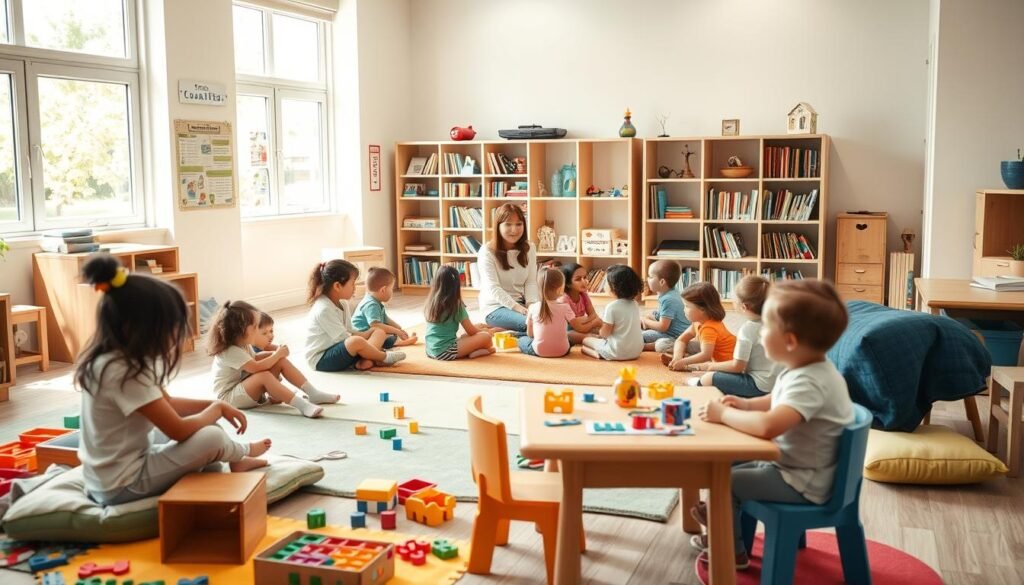Tackle Challenging Child Behaviors with Ease: A Supportive Guide

Did you know that kids who often get upset might not know how to handle their feelings? As a parent, you want the best for your child. That means helping them learn good behavior. Many parents struggle with this, but don’t worry, you’re not alone.
This guide will give you the tools to handle tough behaviors. You’ll learn how to help your child become happy and well-adjusted. It’s all about supporting them on their journey.
Imagine being able to handle those tough moments with confidence. You can teach your child to manage their emotions and develop positive behaviors. Let’s start this journey together. You’ve got this, and we’re here to support you every step of the way!
Understanding Challenging Child Behaviors
As a parent, you’re not alone in dealing with tough child behaviors. About 70% of parents face these issues with their kids. It’s key to know these behaviors are normal and can be handled with the right approach. Using positive discipline and training can help create a supportive space for your child’s growth.
Studies show kids with regular routines have 50% fewer problems than those without. This shows how important a daily routine is. It should include time for fun, learning, and rest. This helps your child learn to control themselves and reduces bad behaviors.
It’s also vital for parents and child care providers to work together. When they do, they can see a 30% improvement in behavior. The American Academy of Pediatrics (AAP) backs positive parenting. It can cut down on bad behavior by up to 25% if done right.
The Spectrum of Child Behaviors
Child behaviors range from normal to tough. Every child is different and may act in various ways as they grow. Knowing this helps you spot when your child needs help and act early to avoid bigger problems.
Common Triggers for Difficult Behaviors
Things like tiredness, hunger, and boredom can lead to tough behaviors. Knowing these can help you avoid them. For instance, making sure your child sleeps well and eats right can help prevent bad behaviors.
The Impact of Environment on Behavior
The environment greatly affects your child’s behavior. A supportive and caring space encourages good behavior and reduces bad ones. This means giving your child chances to play, learn, and socialize, and setting clear rules.
The Importance of Consistent Parenting
As a parent, you have a big role in shaping your child’s behavior. Consistent parenting helps your child learn to manage their emotions and actions. By setting clear rules and a routine, you make your child feel safe and secure. This reduces the chance of bad behavior.
Using positive reinforcement can encourage good habits in your child. Setting clear expectations and consistent consequences helps them understand what’s expected. Being consistent helps your child feel secure and stable, which is vital for their growth.

Establishing Clear Boundaries
Clear boundaries are key in consistent parenting. Setting clear rules and consequences helps your child know what’s expected. This reduces confusion and anxiety, leading to better behavior and a stronger bond between you and your child.
The Role of Routine and Structure
Routine and structure are also vital. A daily routine and a structured environment make your child feel safe and secure. This reduces bad behavior and helps them develop important skills like time management and organization.
Effective Communication Strategies
As a parent, you want to talk well with your child. But sometimes, it’s hard. Dealing with defiant kids needs patience and the right way to talk. Good parenting tips can help you and your child get closer.
Communication is not just about words. Nonverbal cues like body language and tone are key. They tell a lot, too.
Active Listening Techniques
Active listening is a strong tool for talking well. Keep eye contact and ask questions that encourage talking. This makes your child feel understood and helps avoid fights.
Using Positive Language
Positive talk is important too. Focus on what your child does right, not wrong. This boosts their confidence and encourages good behavior. It’s tough, but with the right tips, you can do it.
Positive Reinforcement Techniques
As a parent, you want to encourage good behavior in your child. Positive reinforcement is a powerful tool to achieve this. It helps address challenging child behaviors effectively.
Positive reinforcement significantly impacts children’s behavior. It fosters a positive environment and promotes good behavior. It also helps children develop a positive self-image, boosting their self-esteem.
There are several types of reinforcement. Social reinforcement is effective for younger children who value attention and approval. Material reinforcement includes rewards like toys, stickers, or treats. Activity reinforcement lets children engage in preferred activities as a reward.

Consistency in positive reinforcement is key. Children should receive acknowledgment every time they exhibit a desired behavior. Using a variety of reinforcements keeps children motivated and engaged.
For example, sticker charts can track positive behaviors. Rewards are given after reaching a certain number of stickers. Simple gestures like high fives or hugs can also reinforce desired behaviors.
| Type of Reinforcement | Description | Example |
|---|---|---|
| Social Reinforcement | Attention and approval from caregivers | Verbal praise, hugs |
| Material Reinforcement | Tangible rewards | Toys, stickers, treats |
| Activity Reinforcement | Preferred activities as rewards | Extra playtime, special outings |
By using positive reinforcement techniques in your behavior therapy for kids, you can address challenging behaviors. Remember, consistency and variety are key to keeping your child motivated and engaged.
Setting Realistic Expectations
As a parent, you want the best for your child. But knowing what to expect can be tough. Understanding developmental milestones helps you set realistic goals. This way, you can support and guide your child to succeed.
Research shows clear expectations can cut down on bad behavior by half in early childhood. Setting realistic goals helps your child learn self-control. Clear rules and rituals teach them right from wrong.
A structured routine can also reduce bad behavior by 40%. It gives your child a sense of security. Positive reinforcement, like praise and rewards, boosts good behavior by 30%. Effective child behavior management and positive discipline are essential for your child’s growth.
Teaching Emotional Regulation
As a parent, you have a big role in teaching your child to manage their feelings. This means helping them know and understand their emotions. You also teach them how to handle big feelings without losing control.
Using special training and methods, you can help your child learn to control their emotions. This can make their behavior better and improve their happiness.
Studies say kids should learn to control their feelings by age five. But kids with ADHD or anxiety might need more help. It’s important to start slowly and make tasks easy for your child to avoid feeling overwhelmed.
Using pictures or charts can really help kids with Autism Spectrum Disorder (ASD) learn new things. A 2014 study found that visual aids help kids understand better, talk more, and get excited about learning. These tools can be part of your training to help your child manage their feelings.
Teaching your child to control their emotions can make their life better. It helps them get along with others and do well in school. Be patient and keep practicing. With the right training and methods, your child can grow and succeed.
Behavioral Interventions That Work
As a parent, you want to have many tools to manage tough behaviors. Dealing with defiant kids can be tough, but the right methods can help. Using positive reinforcement and setting clear rules can really help.
Consider using time-out techniques and behavior charts. These tools help track your child’s progress and give feedback. Using them with other good parenting tips can help your child succeed.
Teaching self-calming strategies is also key. It helps kids stay calm when upset. By teaching these and supporting them, you help them manage their feelings and actions better.
Every child is different, so what works for one might not work for another. Being patient, consistent, and supportive is key. With the right approach and tips, you can help your child overcome tough behaviors and grow positively.
The Role of Social Interaction
As a parent, you have a big role in shaping your child’s behavior. Social interaction is key in this process. Teaching your child to share, take turns, and work with others helps them make friends and avoid bad behavior. Behavior therapy for kids is effective, and social skills are a big part of it.
Children learn by playing and talking with others. As a parent, you can help them practice these skills. For instance, join your child in group activities like sports or clubs. This helps them make friends and learn important social skills.

Fixing tough child behaviors needs a full plan that includes social skills, therapy, and positive feedback. By supporting your child and teaching them important skills, they can grow up happy and well-adjusted. Every child is different, so be patient and find what works best for them.
Seeking Professional Help
As a parent, you want the best for your child. Sometimes, this means getting professional help for child behavior management. A pediatrician or child psychologist can help you understand your child’s behavior. They can also teach you positive discipline strategies to handle tough behaviors.
About 1 in 5 kids face a mental health issue at some point. Early help can cut the risk in half. If your child’s behavior is causing worry for weeks, it’s time to get help.
Professional help can create a plan for your child’s child behavior management. This might include therapy, meds, or family counseling. Remember, asking for help shows you care deeply about your child’s well-being.
Building a Support Network
As a parent, you don’t have to face challenges alone. Building a support network can offer the guidance and encouragement you need. By joining parent groups and working with educators, you can better understand your child’s behaviors. This helps you develop strategies to manage tough behaviors.
Learning about setting clear boundaries and using positive reinforcement can be very helpful. These techniques are key to effective discipline. Behavior intervention methods, like identifying triggers and teaching new behaviors, can also reduce challenging actions. Working with educators and other parents helps create a plan to support your child’s growth.
Joining parent groups, attending workshops, and teaming up with educators are great ways to build your network. Sharing knowledge and experiences helps you understand your child’s needs better. Remember, asking for help is okay and is part of building a strong support network.
| Support Network | Benefits |
|---|---|
| Parent Groups | Guidance, advice, and encouragement from other parents |
| Collaborating with Educators | Developing effective strategies for managing challenging behaviors and supporting social, emotional, and cognitive development |
| Workshops and Seminars | Learning about parent training techniques and behavior intervention methods |
The Importance of Self-Care for Parents
As a parent, taking care of yourself is key to handling the tough times of
. Self-care helps you keep your physical, emotional, and mental health strong. This way, you can give your best to your child and help them grow positively.
Managing Stress as a Caregiver
Being a parent is both rewarding and challenging. It’s important to manage your stress to avoid burnout. Make time for yourself every day, even if it’s just a few minutes of calm or a fun activity.
Don’t hesitate to reach out to your support network when you need a break or someone to talk to.
Resources for Parental Support
You don’t have to face this alone. Look for help from parent support groups, online forums, or professional counselors. These resources can offer you emotional and practical support.
Source Links
- Parents Guide to Problem Behavior – https://childmind.org/guide/parents-guide-to-problem-behavior/
- PDF – https://centerforresilientchildren.org/helping-children-who-use-challenging-behaviors/behavior-planning-six-step-process/
- Resources to Address Challenging Behaviors – https://www.virtuallabschool.org/fcc/positive-guidance/lesson-4
- Understanding and Responding to Challenging Behaviors – https://www.childcare.gov/consumer-education/understanding-and-responding-to-challenging-behaviors
- Understanding Challenging Behavior in Early Childhood Education: A Focus on Communication Skills – https://www.lena.org/understanding-challenging-behaviors-in-early-childhood-education-focus-on-communication/
- Handling Challenging Behavior: 8 parent strategies – Skill Point Therapy – https://www.skillpointtherapy.com/handling-challenging-behavior-8-parent-strategies/
- Parenting and Child Development: A Relational Health Perspective – https://pmc.ncbi.nlm.nih.gov/articles/PMC7781063/
- 4 Communication Strategies to Improve & Prevent Problem Behaviors – https://www.avidspeech.com/communication-strategies-problem-behaviors/
- Challenging Behavior as Communication | EBIP – https://ebip.vkcsites.org/challenging-behavior-as-communication/
- The Impact Positive Reinforcement Has on A Child’s Behavior – Early Advantage Child Care – https://www.earlyadvantagedcc.com/early-advantage-parent-resources/the-impact-positive-reinforcement-has-on-a-childs-behavior/
- Understanding and Addressing Challenging Behaviors through Positive Reinforcement. – https://www.adinaaba.com/post/understanding-and-addressing-challenging-behaviors-through-positive-reinforcement
- How Positive Reinforcement Encourages Good Behavior in Kids – https://www.parents.com/positive-reinforcement-examples-8619283
- ConroyFactsheet.indd – https://challengingbehavior.org/docs/RecommendedPractices_preventing-challenging-behavior.pdf
- Addressing Challenging Behaviors in Young Children | Robyn Taylor Child Development & Education Centres – https://www.robyntaylor.com.au/addressing-challenging-behaviors-in-young-children/
- Strategies for Managing Challenging Behaviors at Home – https://aimhigheraba.com/strategies-for-managing-challenging-behaviors-at-home/
- How Can We Help Kids With Self-Regulation? – Child Mind Institute – https://childmind.org/article/can-help-kids-self-regulation/
- Simple evidence-based strategies for teaching emotion regulation? – https://asatonline.org/research-treatment/clinical-corner/teaching-emotion-regulation/
- Intervention to Strengthen Emotional Self-Regulation in Children with Emerging Mental Health Problems: Proximal Impact on School Behavior – https://pmc.ncbi.nlm.nih.gov/articles/PMC2880630/
- 10 Behavior Intervention Strategies for Young Students – https://www.branchingminds.com/blog/10-behavior-intervention-strategies-for-young-students
- What strategies can educators implement to prevent or address challenging behaviors? – https://iris.peabody.vanderbilt.edu/module/bi2-elem/cresource/q1/p01/
- Supporting Young Children with Challenging Behavior – Connecticut Office of Early Childhood – https://www.ctoec.org/supporting-young-children-with-challenging-behavior/
- How social-emotional learning can help challenging behavior – https://www.lillio.com/blog/how-social-emotional-learning-can-help-challenging-behavior
- Social Challenges of Kids With Learning Problems – Child Mind Institute – https://childmind.org/article/social-challenges-kids-learning-problems/
- Understanding Child’s Behavior: When to Seek Professional… – https://peaceofmind4wellness.com/understanding-childs-behavior-when-to-seek-professional-counseling/
- Children and Mental Health: Is This Just a Stage? – https://www.nimh.nih.gov/health/publications/children-and-mental-health
- Understanding and Managing Children’s Behaviors | HeadStart.gov – https://headstart.gov/mental-health/article/understanding-managing-childrens-behaviors
- How to Address Challenging Behaviors in Children – https://www.kvc.org/blog/address-challenging-behaviors-children/
- Supporting children with challenging behaviour – THE EDUCATION HUB – https://theeducationhub.org.nz/supporting-children-with-challenging-behaviour/
- Parenting Knowledge, Attitudes, and Practices – Parenting Matters – https://www.ncbi.nlm.nih.gov/books/NBK402020/
- Caregiver Burnout: Why Self-Care Is Essential to Parenting – Child Mind Institute – https://childmind.org/article/fighting-caregiver-burnout-special-needs-kids/







One Comment